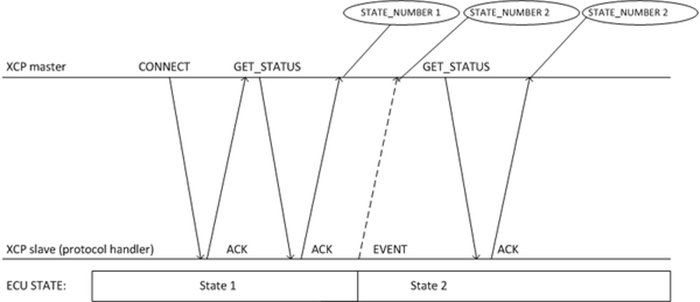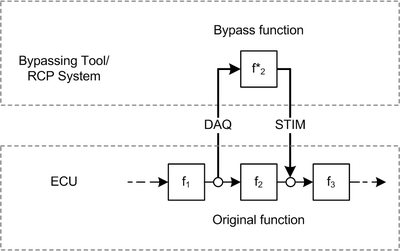Some standard commands:
➢Set up Connection With Slave
➢Disconnect From Slave
➢Get Current Session Status From Slave
➢Get Communication Mode Info
➢Get Identification From Slave
➢Request to Save to Non-volatile Memory
➢Get Seed for Unlocking a Protected Resource
➢Send Key for Unlocking a Protected Resource
➢Set Memory Transfer Address in Slave
➢Upload From Slave to Master
➢Build Checksum Over Memory Range
Address oriented memory read access
- Measurement
•Reading memory periodically (polling)
•No ECU specific code necessary
- Event synchronous measurement
•Reading memory at a specific point in time or event (DAQ)
•ECU specific code necessary
Address oriented memory write access
- Calibration
•Writing memory periodically
•No ECU specific code necessary
- Event synchronous calibration
•Writing memory at a specific point in time or event (STIM)
•ECU specific code necessary
Bypassing
•Simultaneously making use of Synchronous Data Acquisition (DAQ) and Synchronous Data Stimulation (STIM) •At least two DAQ lists are required one DAQ list for reading variables (Data Acquisition) one DAQ list for writing variables (STIM) •Specific event channels required, which control the bypassing process |
|
Time correlation
•XCP offers services to read current value of the slave clock of the ECU
•Enables the calibration tool to correlate measurement data from different ECUs
•The command to get the XCP slave clock is GET_DAQ_CLOCK_FROM_SLAVE
Flash programming
- Flashing with XCP is roughly subdivided into three areas:
▪Preparation
▪(e.g. checking versions to avoid unsuitable memory content)
▪Execution
(new content is sent to the ECU and written to memory)
▪Post-processing
(e.g. checksum checking, etc.)
- Rather limited functionality
(no serial number handling etc.)
- Information about the flash sectors etc. is part of the A2L file
ECU states
Two mechanisms to provide current ECU state:
▪Mandatory:
XCP slave reports the current state to the XCP master
in the response to the GET_STATUS command
▪Optional:
If XCP slave supports asynchronous event messages,
it can use the event EV_ECU_STATE_CHANGE
to inform XCP master about a state change
and new STATE_NUMBER
XCP slave sends the event message to the XCP master once
with the next GET_STATUS request the XCP master receives the STATE_NUMBER again.

